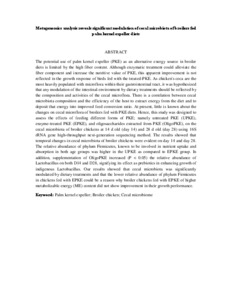Citation
Chen, Wei Li and Tang, Shirley Gee Hoon and Jahromi, Mohammad Faseleh and Su, Candyrine Chui Len and Idrus, Zulkifli and Abdullah, Norhani and Liang, Juan Boo
(2019)
Metagenomics analysis reveals significant modulation of cecal microbiota of broilers fed palm kernel expeller diets.
Poultry Science, 98 (1).
pp. 56-68.
ISSN 0032-5791; ESSN: 1525-3171
Abstract
The potential use of palm kernel expeller (PKE) as an alternative energy source in broiler diets is limited by the high fiber content. Although enzymatic treatment could alleviate the fiber component and increase the nutritive value of PKE, this apparent improvement is not reflected in the growth response of birds fed with the treated-PKE. As chicken's ceca are the most heavily populated with microflora within their gastrointestinal tract, it was hypothesized that any modulation of the intestinal environment by dietary treatments should be reflected by the composition and activities of the cecal microflora. There is a correlation between cecal microbiota composition and the efficiency of the host to extract energy from the diet and to deposit that energy into improved feed conversion ratio. At present, little is known about the changes on cecal microflora of broilers fed with PKE diets. Hence, this study was designed to assess the effects of feeding different forms of PKE; namely untreated PKE (UPKE), enzyme-treated PKE (EPKE), and oligosaccharides extracted from PKE (OligoPKE), on the cecal microbiota of broiler chickens at 14 d old (day 14) and 28 d old (day 28) using 16S rRNA gene high-throughput next-generation sequencing method. The results showed that temporal changes in cecal microbiota of broiler chickens were evident on day 14 and day 28. The relative abundance of phylum Firmicutes, known to be involved in nutrient uptake and absorption in both age groups was higher in the UPKE as compared to EPKE group. In addition, supplementation of OligoPKE increased (P < 0.05) the relative abundance of Lactobacillus on both D14 and D28, signifying its effect as prebiotics in enhancing growth of indigenous Lactobacillus. Our results showed that cecal microbiota was significantly modulated by dietary treatments and that the lower relative abundance of phylum Firmicutes in chickens fed with EPKE could be a reason why broiler chickens fed with EPKE of higher metabolizable energy (ME) content did not show improvement in their growth performance.
Download File
![[img]](http://psasir.upm.edu.my/14894/1.hassmallThumbnailVersion/Metagenomics%20analysis%20reveals%20significant%20modulation%20of%20cecal%20microbiota%20of%20broilers%20fed%20palm%20kernel%20expeller%20diets.pdf)  Preview |
|
Text (Abstract)
Metagenomics analysis reveals significant modulation of cecal microbiota of broilers fed palm kernel expeller diets.pdf
Download (38kB)
| Preview
|
|
Additional Metadata
Actions (login required)
 |
View Item |

